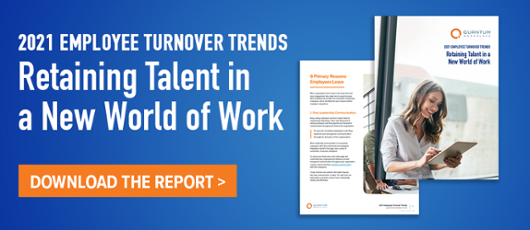How Flexible Work Practices Reduce Employee Turnover
 Up until a few years ago, salary was king of the career decision ladder. Whether retaining current employees or hiring new talent, money was the ultimate factor when choosing one company over another. However, salary is no longer the top priority when it comes to employee benefits.
Up until a few years ago, salary was king of the career decision ladder. Whether retaining current employees or hiring new talent, money was the ultimate factor when choosing one company over another. However, salary is no longer the top priority when it comes to employee benefits.
In today’s world, there are many factors that help drive employee engagement and retention. With 89% of employees wanting hybrid or remote work environment, flexibility and work-life balance has officially topped the charts of employee benefits.
According to the 2021 Inc. Best Workplaces contest, the top 9 corporate perks include:
- Paid maternity leave longer than 8 weeks
- Paid paternity leave
- Remote work stipend
- Unlimited paid time off
- Employee stock ownership
- Paid time off for community service
- Reimbursement for health club memberships
- Learning and development stipend
- Company trips
This signals a strong need for workplace flexibility from the ability to balance family planning with work to boosting your mental and physical health, skills, and peace of mind.
It's no wonder the tide has turned in the world of work benefits, but how does workplace flexibility play a part in retaining employees and reducing turnover?
Here are 3 reasons why flexible work practices reduce employee turnover and retention.
1. Flexible vs. Fast-Paced.
The idea of finding an ideal work-life balance can seem mythical for some. The fast-paced working world has caused employees to become burnt out, disconnected, and unhappy with their workplaces. And with tech start-ups (and the associated make-it-happen culture) booming, that perfect work-life balance can seem farther out of reach.
When companies lack sufficient workplace flexibility, employees are less capable of balancing life stressors and may choose to leave the workforce altogether. In fact, employees who are given ample flexibility are 4 times less likely to become a retention risk.
Over time, employers have begun to expect more from their employees. Remote work as a result of the pandemic expanded the workday from 9-5 to 9-9. And with technology at employees' fingertips and blurred lines of work and home-life, the "workday" transformed to "all-day."
Employers recognized this imbalance, and some decided to do something about it. Businesses that began to offer flexible work environments are, and will continue to be, very attractive companies to employees.
2. The Benefits of Workplace Flexibility.
The statistics prove it: providing hybrid and remote work is directly correlated with employee engagement. Engaged employees not only choose to stay at their current company, they sing its praises to family, friends, and top talent currently searching for their next career move. Employees who are happy and feel valued by their company become your employer brand ambassadors. These de facto recruiters share their stories with friends, family, and social networks, where today’s talent is searching for their next career.
Not only does flexibility retain and attract employees, it also makes employees more productive by giving them the space to work when and how they want. In fact, 79 percent of employees say working remotely had little effect on their day-to-day performance. Autonomy in the workplace leads to a much less stressful working environment.
What if you have a sales rep who handles the western US territory, when your HQ is on the East, 3 hours ahead? Or what if your night-owl product designer can ship code at record speed at 9 pm? Having the freedom to work how you want, when you want is a highly sought-after benefit modern employees are looking for.
3. Forging Ahead with Workplace Flexibility.
Flexibility has become a necessity in today’s workplace culture. So much so that companies, like WerkLabs, exist solely to help organizations and their employees "reinvent the workplace."
For companies that are on the right track, it's important to understand what they are doing right. More than half of the Best Workplaces (58%) offer unlimited paid time off to their employees. No forms, no rules, no tracking days—employees just take the time they need to recharge and refuel. The same applies to mental health. 70% of the best places to work provide access to counselors, mental health providers, and other employee assistance programs.
HubSpot has also made strides toward a flexible work environment with its unlimited vacation policy and flexible work hours. Need to work from home two days a week? Or take a day off for a doctor’s appointment, to travel for a wedding, or surprise Mom and Dad for a much overdue visit? Go do it! HubSpot has seen the impact of our flexible work plan through both the hard work of employees and in the positive feedback we receive.
Conclusion
The 9-5 is dead. If you’re looking for a way to both engage and retain the top talent at your company, flexibility is key. Providing employees the freedom to come into the office when it works best for them will no doubt improve their engagement and productivity levels and ultimately drive the success of your business. Give your employees the reigns to dictate their own work schedule, and you’ll be amazed at the production of work and the talent you attract and retain by doing so.
For more strategies for attracting and retaining employees in a new world of work, download our research report, 2021 Employee Turnover and Retentions Trends.







